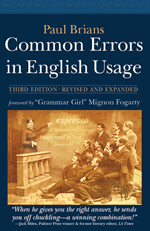Both agnostics and atheists are regularly criticized as illogical by people who don’t understand the meaning of these terms. An agnostic is a person who believes that the existence of a god or gods cannot be proven or known. Agnosticism is a statement about the limits of human knowledge. It is an error to suppose that agnostics perpetually hesitate between faith and doubt: they are confident they cannot know the ultimate truth. Similarly, atheists believe there are no gods. Atheists need not be able to disprove the existence of gods to be consistent just as believers do not need to be able to prove that gods do exist in order to be regarded as religious. Both attitudes have to do with beliefs, not knowledge.
“Agnostic” is often used metaphorically of any refusal to make a judgment, usually on the basis of a lack of evidence; people can be agnostic about acupuncture, for instance, if they believe there is not enough evidence one way or another to decide its effectiveness.
BUY THE BOOK!
